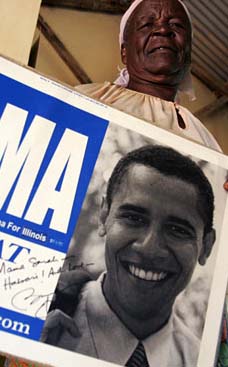
I was heartbroken. Tate Lucas was an incredibly sweet, older man who worked on the homestead. He spoiled me with gifts of papaya and homebrew, and through a translator, he told me harrowing stories about treks to Botswana to work in the mines and Namibia’s struggle for independence. I had made a promise to myself to become fluent in Kwanyama so that we could communicate freely with each other. And now I was on my way to his funeral. One of my host sisters in the capital had confided in me that Tate Lucas was HIV-positive but that he had kept it a secret to avoid being stigmatized. I had not seen him on the homestead since my return a couple of days earlier, but I thought maybe he was away receiving treatment for tuberculosis, an HIV related opportunistic infection. Namibia has one of the highest HIV/AIDS infection rates in the world, estimated at 15.3% among adults, with close to 180,000 people living with HIV/AIDS , acccording to the UNAIDS 2008 Report on the Global AIDS Epidemic. Although I knew the statistics and had heard the funeral guns going off in the village, I personally had not lost anyone to the disease.
Amy Taylor writes: A funeral for Tate Lucas
A funeral for Tate Lucas
by Amy Taylor
December 5, 2008
I had just returned from the December holiday. As a Peace Corps Volunteer, I lived in a village in the northern region of Namibia, known as Ovamboland. I was sitting under a tree trying to ignore the desert heat when one of the children on the homestead came to me and said, “Tate Ismael is waiting for you in the truck.”
“Am I going somewhere?” I asked. I received a short nod in the affirmative. After three months, I had learned to stop asking questions. I had accepted a status quo that included a general lack of understanding, which could be attributed to the language barrier—my limited Kwanyama and the villagers limited English. So, I grabbed my water bottle and some sunscreen and took off across the yard.
Sure enough, my host brother, Ismael, was waiting behind the wheel with his wife and mother beside him. A truck bed of extended family members filled the back. I jumped in, and it was not until we were bouncing across the African bush that I thought to ask where we were going. The answer was unexpected. “The funeral for Tate Lucas,” said one of the men.
I was heartbroken. Tate Lucas was an incredibly sweet, older man who worked on the homestead. He spoiled me with gifts of papaya and homebrew, and through a translator, he told me harrowing stories about treks to Botswana to work in the mines and Namibia’s struggle for independence. I had made a promise to myself to become fluent in Kwanyama so that we could communicate freely with each other.
And now I was on my way to his funeral. One of my host sisters in the capital had confided in me that Tate Lucas was HIV-positive but that he had kept it a secret to avoid being stigmatized. I had not seen him on the homestead since my return a couple of days earlier, but I thought maybe he was away receiving treatment for tuberculosis, an HIV related opportunistic infection. Namibia has one of the highest HIV/AIDS infection rates in the world, estimated at 15.3% among adults, with close to 180,000 people living with HIV/AIDS , acccording to the UNAIDS 2008 Report on the Global AIDS Epidemic. Although I knew the statistics and had heard the funeral guns going off in the village, I personally had not lost anyone to the disease.
As it turned out, Tate Lucas was not lost at all. As the truck pulled up to another small homestead some sad kilometers later, Tate Lucas came forward in his Sunday best to welcome us. I was shocked. I turned to the man beside me and in utter confusion I said, “I thought we were going to the funeral for Tate Lucas.”
“We are,” he said. “Tate Lucas’s brother has died and we must support him.”
I stayed close by Tate Lucas’s side for the rest of the day, and for the first time, I fully absorbed the reality of his disease. By the time we got home that evening, I had changed my promise to speak Kwanyama fluently—I have always been terrible with languages—to a promise to do everything in my power to assist the fight against HIV/AIDS.
I started with HIV/AIDS activities in the classroom where I taught English and Geography, then expanded to regional youth events with other volunteers. Finally, I helped produce an HIV/AIDS awareness CD that was distributed to 5,000 taxi drivers throughout the country. After returning to the United States two years later, I co-founded Humanitarian Notes with another returned Peace Corps volunteer to continue making HIV/AIDS awareness music in Africa. I am now in West Africa working to produce a Liberian HIV/AIDS awareness CD that will be played in even the most remote corners of Liberia through a network of community radio stations.
Tate Lucas is still alive and well, but more than 1.5 million people in sub-Saharan Africa have lost their lives to HIV/AIDS, and another 22 million are living with the diseas. I am more convinced than ever that we cannot afford to wait until the next funeral to take action.
Note: Humanitarian Notes is a registered non-profit organization. Donations are tax deductible and can be made online at www.humanitariannotes.org.













